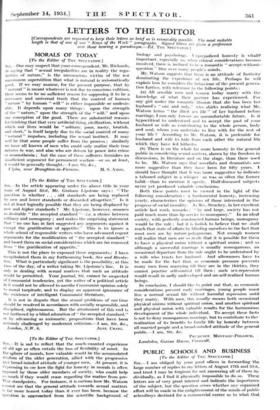[To the Editor of TITE Srec - r_vroa.] Sin,—It is sad to
reflect that the much-vaunted experience of old age so often entails the loss of flexibility of mind. In the sphere of morals, how valUable would be the-accumulated ,Wisdom of the older generation, allied with the progressive and hroad-minded attitude of-younger men. At present, it is eepressing to see how the fight for honesty in morals is often opposed by those older members of society, who could help f-0 much if they would cease regarding the matter from pre, War standpoints. For instance, it is curious how Mr. Watson annot see that the general attitude towards sexual matters is far more honest today than it ever has been, because the question is approached from the scientific background. of biology and psychology. Unprejudiced honesty is vitally important, especially as, when ethical considerations become involved, there is inclined to be a romantic " accept-without- question " blur over many people's minds. Mr. Watson suggests that there is an attitude of furtivity dominating the experience of sex life. Perhaps he will explain how he considers the behaviour of the present genera- tion furtive, with reference to the following points : (a) All sensible men and women today marry with the knowledge of what their partner has experienced. For any girl under the romantic illusion that she has been her husband's " one and only," who shirks realizing what Mr. Watson terms the illicit sex life " of her husband before marriage, I can only foresee an uncomfortable future,. Is it hypocritical to understand and to accept the past of your husband or wife as contributing to the whole person, body and soul, whom you undertake to live with for the rest of your life ? According to Mr. Watson, it is preferable for husband and wife to hide from each other the natural life which they have led hitherto.
(b) There is on the whole far more honesty in the general public in considering sexual matters, shown by the freedom in discussions, in literature and on the stage, than there used- to be. Mr. Watson says that novelists and dramatists are. more suggestive than they have been for fifty years. I should have thought that it was more suggestive to indicate a tabooed subject in a whisper--as was so often the former habit—than to mention it openly. Half-discussed subjects never yet produced valuable conclusions.
Both these points must be viewed in the light of the following consideration : a fundamental honesty, increasing yearly, characterizes the opinions of those interested in the progress of social morality. As Mrs. Strachey, in her excellent article last week, remarks : " by and large, society has not paid much more than lip service to monogamy." In an ideal. society, with perfectly constructed human beings, monogamy would be the rule ; but it is foolish to believe that we shall reach that state of affairs by blinding ourselves to the fact that most men are by nature polygamous. Not enough women• will realize that men are so in ide that it is possible for them to have a physical union without a spiritual union ; and so although a successful marriage is usually monogamous, an occasional departure from the rule ought to be understood by a wife who trusts her husband. And allowances have to be made for the fact that, as economic pressure prevents Many men from marrying till they are in the thirties, they cannot practise self-control till then ; such sex-repression would result in sadly undeveloped and un-self-realized human beings.
In conclusion, I should like to point out that, as economic considerations prevent early marriages, young people must live a normal sexual life without harmful repression until they marry. With men, this usually means both occasional physical unions without spiritual union, and another spiritual and physical anion with valuable results for the harmonious development of the whole individual. To accept these facts is not to deny monogamous marriage, but to contribute to the. realization of its benefits to family life- by honesty between all married people and a broad-minded attitude of the general public.—I am, Sir, &c.










































 Previous page
Previous page